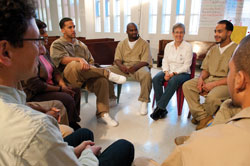The Story of How One Professor Educates the Incarcerated
 When Dr. Eleanor Novek walks into a room, she is a woman of paradoxes. She’s soft-spoken yet a leader, conservative in her mannerisms, yet witty and fun-loving in her conversation. So it is no surprise to find out that despite her small stature and gentle nature, she works with some of the grittiest, most terrifying people in the country: convicts.
When Dr. Eleanor Novek walks into a room, she is a woman of paradoxes. She’s soft-spoken yet a leader, conservative in her mannerisms, yet witty and fun-loving in her conversation. So it is no surprise to find out that despite her small stature and gentle nature, she works with some of the grittiest, most terrifying people in the country: convicts.
As an Associate Professor of Communication at the University, Novek teaches classes in journalism, communication ethics, gender, race and media, and research methods. She preaches an interactive teaching method in her classroom, stressing student involvement and student/professor open communication rather than presenting lectures.
“Most of our class time is spent with selected students speaking about links, interesting articles and op-eds, and the student’s own take and position on the current issue with help from classmates,” said junior communication and foreign language student Jenna Lally, who is currently taking Novek’s Editorial Writing class.
“This kind of environment is conducive to students’ comfortability in adding to the discussion and speaking in class, which I don’t see in most of my lecture-based classes,” continued Lally.
But Novek’s collaborative methods of teaching are not being applied strictly at the University. This is the same kind of atmosphere she produces when she works in prisons. Yes, that was plural; she currently works at not just one prison, but two.
First is with an organization called Alternatives to Violence Project (AVP), a volunteer-based group that brings workshops to over 100 penitentiaries that enable people to practice the same non-violent skills and techniques that were used by Mahatma Gandhi and Dr. Martin Luther King, Jr. Along with leading workshops, Novek is also the coordinator for the NJ sector of AVP.
“I’m in charge of organizing the workshops [in NJ],” Novek said of her coordinator position. “I ask [the members in AVP] who would like to go, get clearance from the prison, and make sure everyone who goes into the prison has gotten a background check; everyone who goes into a prison must have a background check first.”
Novek’s prison involvement was inspired by reading Jailhouse Journalism, a book by James McGrath Morris about inmate-run newspapers. This led her to reach out to Dr. Rebecca Sanford, current Assistant Chair of the Communication Department, who was a graduate student teaching in a women’s prison at the time.
For the next four years, Novek and Sanford would teach journalism together at a women’s correctional facility, publishing an inmate newspaper as well, until the prison shut the operation down in 2007 due to lack of funding.
After leaving the women’s facility, Novek still had a passion to teach incarcerated people. She eventually landed a volunteer opportunity teaching at the New Jersey State Prison in Trenton.
Since 2007 she has been working once a week with the men’s maximum security prison, offering a class she describes as “creative writing, journalism and current events.”
When Novek first began teaching at Trenton, she was not as much scared of the inmates as she was of the prison guards. “They were standing around with clubs in their hands, motor cycle-type helmets on; they looked like a SWAT team. They were scary,” she said. “I have never been treated with anything but appreciation by incarcerated people.”
But her main work rests with AVP, which she discovered after attending a Quaker meeting with her husband and learning the religions ideals. A Quaker herself, Novek notes AVP began as an organization run in upstate NY by a group of Quakers, speaking to prisoners about non-violence and how to accept a life of non-violence, which are the main focuses of the religion.
An AVP workshop lasts about 20 hours over the course of a weekend. Inmates participate in games, activities and exercises with workshop leaders that all emphasize anti-violence, respect, sharing and trust. Although she does not condone what some of these inmates have done, Novek believes that they still deserve attention and to be treated like human beings. Shunning them away from the world is not the answer.
“Our system doesn’t seem to be making people better when they leave, and at some point most of these people are getting back into society,” said Dr. Aaron Furgason, Chair of the Communication Department at the University. “It is remarkable and commendable that [Novek] is involved in such an important opportunity for people to redeem themselves.”
This formula of balancing respect, sharing, and most importantly, trust, has been something that Novek has incorporated into her teaching at the University, as well. Walking into her class, do not expect to see a dry, elongated lecture with no feedback from students. Her classroom is a space of free-flowing ideas and dialogue, which she credits much to her involvement with AVP.
“I don’t think I knew what I was doing at all when I was teaching by a more traditional model,” she confessed. “The traditional model is, I threaten you with a test, I threaten you with grades, I threaten you with late, not, ‘look at this cool thing were doing together,’ and that’s teaching.”
One of her most memorable moments in a prison came in the form of an AVP exercise where inmates look one another in the eye, seeing the opposite as a family member of someone they wronged. In some cases, the person staring at them is the loved one of a person they had murdered, which brings some of these guarded men to weep.
“It’s beautiful,” Novek said of the experience. “It’s just a really moving thing to see.”
The work Novek is doing for the community isn’t always glamorous, but it is making the world a better, safer place to live. She doesn’t go around flashing awards or saying “look at me,” but that’s because she doesn’t need to.
Specialist Professor Kristine Simoes said of Novek, “Dr. Novek is incredibly humble, despite her outstanding achievements and dedication both at Monmouth and outside of it. She is one of the most intelligent people I have ever met, and is truly an inspiration to both her peers and students.”
Novek will be offering a class this upcoming spring titled, “Creating a Culture of Peace” that will be based off of the concepts she uses in her AVP workshops. Her style in that class will be the same as all the others, where she recognizes, “You cannot force people to learn, but you can inspire them to want to learn.” And as long as she is at the University, she will continue to serve as an inspiration for us all.
PHOTO COURTESY of Eleanor Novek


